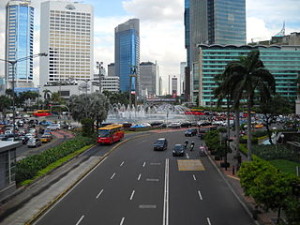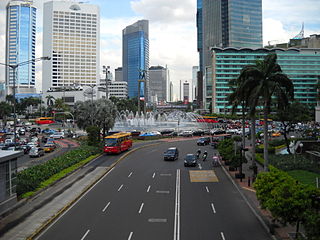 Indonesian President Joko Widodo has unveiled a new economic policy package that aims to stimulate the national economy amid a highly uncertain global setting.
Indonesian President Joko Widodo has unveiled a new economic policy package that aims to stimulate the national economy amid a highly uncertain global setting.
On September 9, Widodo disclosed initial details of the stimulus package that is designed to boost the competitiveness of domestic industries, said a report by state-run Antara News.
The presidential announcement comes as the country’s economic growth has slowed to the six-year low of 4.67% in the second quarter of 2015 year-on-year, according to Indonesia-Investments.
The central government will implement this stimulus package in coordination with Bank Indonesia (the country’s central bank) and the Financial Services Authority with the aim to create a conducive macroeconomic environment.
The first phase of this package encompasses three policies. The first policy seeks to boost Indonesia’s industrial competitiveness through deregulation, curtailing red tape, and enhancing law enforcement as well as business certainty.
The president said 89 regulations had been revised out of 154 that were evaluated by the administration for breeding inefficiency mainly through overlapping or duplication, while regulations that were blocking further development of the nation’s industrial sector were removed.
Moreover, the government has prepared 17 new government regulations, 11 draft presidential regulations, two draft presidential instructions, 63 draft ministerial regulations, and five other draft regulations.
The second policy involves accelerating strategic projects of national interest by eliminating all obstacles to their realization. Over the past couple of years, a few infrastructure projects in Indonesia have been delayed or cancelled altogether due to serious bureaucratic bottlenecks and land acquisition problems.
The new package aims to smoothen the process to obtain necessary permits and land acquisition for such projects as well as to speed up procedures for the procurement of land, goods, and government services.
With the third policy, Widodo intends to increase investment in the country’s property sector. The government will push for housing development for low-income households and the opening up of bigger investment opportunities in the property sector.
Indonesia-Investments also referred to a document published by Indonesia’s Economics Ministry which provides further details about these three policies within the first installment of the stimulus package.
- By altering existing regulations it will be made easier for companies to obtain import permits for products such as sugar, salt, textiles, cosmetics, tires, and pearls.
- To boost the country’s tourism industry, Indonesia will ease visa requirements for foreign visitors.
- To increase palm oil and mineral exports the government will simplify physical checks related to export tax.
- To boost the country’s energy and mining sector, Indonesia will remove certain document requirements.
- The government will issue new regulations to promote special economic zones.
- For certain strategic industries Indonesia will provide a temporary subsidy for gas consumption.
- In October the value added tax will be removed in the transportation sector in order to lower logistic costs.
- To boost the domestic property sector, the Indonesian government will allow foreigners to own luxurious apartments and condominiums worth at least IDR10 billion (US$$700,000).
- The government will raise the threshold for “luxury apartment,” implying that the cheaper ones will no longer be subject to the country’s luxury tax.
- The government will revise a 12-year-old system on wage setting to enhance legal certainty for employees.
- The government plans to provide more rice under its rice subsidy program.
- The government will transfer more funds to the villages. Part of these funds is to be used for infrastructure development.
- LPG-to-fuel converter kits will be handed out to fishermen to make fishing more energy-efficient.
- In cooperation with Bank Indonesia, the government aims to stabilize food prices and safeguard controlled inflation. Regarding beef imports, Indonesia will look at more countries to find competitive prices.
Photo: Taman Renyah





